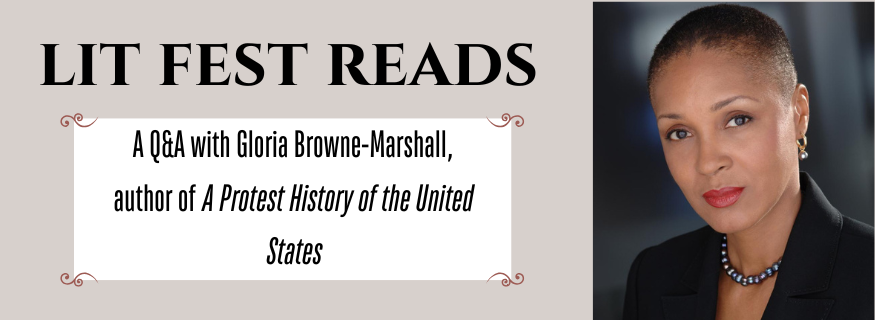
Is reading and writing a form of resistance? We sure think so. After all, in order to change the future, we must understand the past. Gloria Browne-Marshall is doing just that through her new book, A Protest History of the United States. This Emmy Award-winning writer, professor, attorney, and playwright blends her expertise with a rich writing style as a part of Beacon Press’ ReVisioning History series. Gloria’s publishers describe how this work explores 400 years of protest and resistance in US history—and what the unsung heroes of social movements past can teach us about navigating our chaotic world.
Gloria is also a Book Project alumna, Writing in Color member, and Lighthouse instructor. As her book launch approaches, we asked Gloria a few questions to learn more about her writing journey and highlight the inspiring work she’s doing. Read her responses here:
Q: Tell me a bit about your experience at Lit Fest. What was the most memorable moment or something impactful that you learned?
A: In May of 2020, I found Lighthouse just as the world shut down and the COVID pandemic tested our humanity. I had registered for another program in Colorado that shuttered and found the online Lit Fest classes by accident or kismet. It was wonderful from the first class. I met Bill Henderson through Zoom when he taught using A Streetcar Named Desire. My writing background is in playwriting and I immediately connected with using dialogue and visualization of sets to create fictional scenes. My books are mainly nonfiction, but I have short stories and a historical novel that has been in progress for years. I have taken dozens of classes at Lighthouse. But Bill’s classes, in particular, made me see what I could do as a fiction writer and his mentorship (in the Book Project) gave me the confidence to do it. That first class with Bill made the difference. The kindness and patience from Torin, as I navigated Zoom, and Andrea’s guidance in keeping Lighthouse a literary oasis without being a snooty silo provided the balance I needed for a writing home.
Q: Do you think that writing can also be a form of protest or resistance? Does your book fit into that category, or does it strive for other impacts?
A: Writers have always played a role in resistance and protest. I hope my book speaks to the artists in a way that assists them in being activists, too. A Protest History of the United States has references to painters and singers who used their art as protest against injustice and stereotypes as well as a way to voice to voiceless. Ishmael Reed said writing is fighting. I want my book to pay homage to the protesters who rarely receive attention for all they have sacrificed for us and to give today’s protesters fuel for this special work of social justice. Protest is marching but it has a multitude of forms that can and must be utilized to fight the oppressive regimes faced today. Historically, Rosa Parks did not march but refusing to move was protest. Today, reading banned books can be protest and speaking up for the oppressed online or at family outings can be protest. My book covers 500 hundred years of selected protests and protesters so that readers would know that protest was and remains a viable mechanism for creating societal change and fighting injustices. Protest is a powerful tool but is most effective when there is a vision for the change one wants to see in the world and given time to affect deeply rooted systems. Protest is an investment in a better world. Most of what we take for granted today, our rights and privileges, came by way of protest.
Q: Do you have a word of advice for writers, whether they’re just getting started or in the process of publishing their work?
A: My advice is to find other artists who are serious about completing their work. But don’t talk the life out of your project or it will feel as if the book is already completed. Instead, I like to let the energy burn inside, haunting me, pushing me, until it must be expressed on the page or else it will explode.
What inspiring answers, Gloria. We’re so grateful to have her as a part of the Lighthouse community and look forward to reading A Protest History of the United States, releasing on April 22nd, 2025. Be sure to pick up a copy and think about protest in new ways.
This Lit Fest, Gloria is teaching a craft seminar about how we can infuse law into our writing. Register here!

